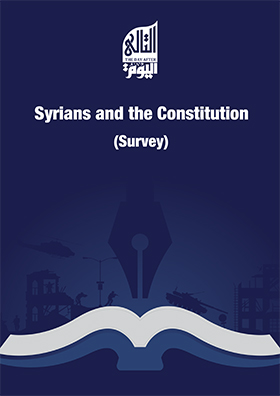 Publication date: November 2020
Publication date: November 2020
This study explores the views of Syrians regarding the UN-supported Syrian Constitutional Committee, the extent of their knowledge about the details of its work, and their views on the most prominent constitutional issues.
The study is based on a survey of 2,966 Syrians (51.8% men and 48.2% women), residing both inside and outside the country, and from a variety of religious and national backgrounds. The data were collected from May to June 2020 inside Syria and in the ten countries that host the highest number of Syrian refugees.
The study begins by analyzing the views of Syrians regarding their priorities and to what extent Syrians are interested in discussing a new constitution. Then it addresses respondents’ perceptions regarding efforts to draft a new constitution and their hopes for the constitutional committee. The study ends by presenting respondents’ views on controversial constitutional issues such as religion and the state, the basic rights and values, and the political system. It also provides several conclusions and recommendations to the members of the Constitutional Committee and to the UN Special Envoy for Syria.
Some main findings include:
- The majority of respondents were not interested in following the work of the committee. Less than half of respondents (46.6%) said they are familiar with the work of the constitutional committee in Geneva.
- A large percentage of Syrians do not know any of the members of the Committee by name.
- Women and those with lower self-reported standard of living were less likely to be well informed on and connected to constitutional reform efforts.
- There is a general belief among the sample under study that the international consensus on the constitution circumvents the main problem in Syria and is a waste of time.
- 33% have no hope for successful results from the constitutional committee. 37.4% has low hope. The reasons behind these results are analyzed and explained in the report.
- Only 7.1% of respondents prioritized the issue of the constitution, while the majority considered that there were more urgent problems such as establishing an official ceasefire.
[iframe src=”https://app.powerbi.com/view?r=eyJrIjoiOTNhMDE2NTQtOTY0OC00MjZhLWJhNWItOGY0NmFmMDk4M2Q4IiwidCI6IjM3ODI2Y2RjLWUyMWMtNGFjMS05ZGY2LTEyYWNlNzMwNDhlMiIsImMiOjl9&pageName=ReportSection60097da826c6b0887900″]
